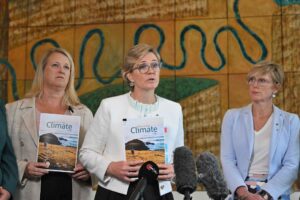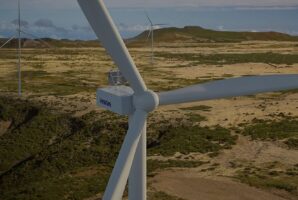As negotiators continue to chip away at potential agreements to be reached in Glasgow, with the end of the week – and the end of COP26 – rapidly approaching, focus still squarely remains on inadequate commitments to keep the goals of the Paris Agreement within reach.
New analysis suggests that the world still remains on track to exceed 1.5 degrees of global warming, with new pledges announced in Glasgow still insufficient to keep warming within safer levels.
An additional report also highlights Australia’s ongoing status as a climate laggard, and international environment groups slam Morrison’s “diabolic” electric vehicle strategy.
Climate Action Tracker challenges progress on limiting global warming
New analysis has raised questions about the strength of emissions reduction commitments being announced by countries during the Glasgow talks.
Over the weekend, two pieces of analysis – published by the International Energy Agency and the Australia-based Climate Resource group – showed that updated emissions reduction pledges announced during the Glasgow talks could be enough to limit global warming to below 2 degrees.
But in a new analysis, Climate Action Tracker said that national targets out to 2030 would still lead to emissions around double what would be consistent with a trajectory for 1.5 degrees of warming. The group noted that while a growing number of countries had adopted longer-term pledges to net zero emissions, updated short-term targets had only reduced the 2030 emissions gap by as little as 15 per cent.
“The vast majority of 2030 actions and targets are inconsistent with net zero goals: there’s a nearly one degree gap between current government policies and their net zero goals,” CEO of Climate Analytics, Bill Hare, said.
“It’s all very well for leaders to claim they have a net zero target, but if they have no plans as to how to get there, and their 2030 targets are as low as so many of them are, then frankly, these net zero targets are just lip service to real climate action. Glasgow has a serious credibility gap.”
Oxfam puts the rich in the spotlight
A new report from Oxfam has put the spotlight on the world’s wealthy, estimating that the world’s richest 1 per cent will produce more than 30 times the amount of emissions that would be compatible with 1.5 degrees of warming.
The assessment of the carbon footprint of the world’s richest highlights the disparity between those contributing to global warming and those who will are most vulnerable to its impacts. The report found that the poorest half of the global population will emit far below levels that would lead to 1.5 degrees of warming.
“The emissions from a single billionaire spaceflight would exceed the lifetime emissions of someone in the poorest billion people on Earth. A tiny elite appear to have a free pass to pollute,” Oxfam’s climate policy lead, Nafkote Dabi, said.
Their over-sized emissions are fuelling extreme weather around the world and jeopardising the international goal of limiting global heating.”
"The total emissions of the richest 10 percent alone are set to exceed the 1.5°C-aligned level in 2030, regardless of what the other 90 percent do" – study from @SEIresearch and @IEEP_eu
This is one of the many reasons why we need climate justice. #COP26https://t.co/IuyQaXozTx
— Greta Thunberg (@GretaThunberg) November 9, 2021
Australia ranked last in major climate action report
Australia has yet again been ranked last amongst its global peers for the strength of its climate policies, in the latest edition of the annual Climate Change Performance Index.
Australia received the lowest score awarded for government climate policies, out of the 64 countries assessed that cover around 90 per cent of global emissions, in recognition of the lack of meaningful national policies to reduce emissions and support the uptake of cleaner energy sources.
“[Australia’s] lack of domestic ambition and action has made its way to the international stage. The experts describe that the country’s international standing has been damaged by climate denialism by politicians, refusal to increase ambition, and refusal to recommit to international green finance mechanisms. Australia has fallen behind its allies and its inaction even attracted public criticism in the run-up to COP26,” the report says.
In the group’s overall assessment, Australia ranked 58th out of 64 countries, with the growth of wind and solar energy use – driven primarily by state and territory governments rather than the federal government – keeping Australia off the bottom of the overall ranking.
The ranking was included in the latest joint assessment completed by environment groups Germanwatch, the New Climate Institute, and the Climate Action Network.
Australia ranked dead last in world on climate policy after Glasgow Cop-out
Australia snubs climate resilient health pledge
A group of 50 countries signed a joint commitment to build climate-resilient and low-carbon health systems, recognising the growing impact that climate change is having on the world’s health infrastructure.
As part of the pledge, countries have committed to both cut emissions attributable to the provision of healthcare and improving the resilience of health infrastructure, such as hospitals, to impacts including extreme weather events.
“The future of health must be built on health systems that are resilient to the impacts of epidemics, pandemics and other emergencies, but also to the impacts of climate change, including extreme weather events and the increasing burden of various diseases related to air pollution and our warming planet,” Director-General of the World Health Organization Dr Tedros Adhanom Ghebreyesus said.
“Health systems must also be part of the solution, by reducing carbon emissions. We applaud those countries that have committed to building climate-resilient and low-carbon health systems, and we hope to see many others following their lead in the near future.”
The pledge was signed by countries including the United States, the United Kingdom and Germany. Australia did not join the pledge.
Australia gets fourth ‘fossil of the day’ for deficient EV strategy
Environment groups awarded Australia it’s fourth ‘fossil of the day’ award at COP26 on Tuesday, following the release of a “diabolic” electric vehicle strategy.
“On top of their complete lack of progress on a worthwhile NDC 2030 update, or any remote plans to end fossil fuels, on the eve of ‘Transport Day’ at COP26, good old PM Scott Morrison has outdone himself again with an ‘inaction plan’ for EVs – in celebration of his love of gas guzzlers,” Climate Action Network said.
The United States was also given a ‘fossil of the day’ award, with the Biden Administration expected to announce an expansion of oil and gas drilling in off the Gulf Coast.











